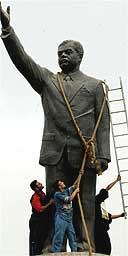In this chapter entitled, “The Culture of Journalism”, we
examined some of the major issues facing journalism. An issue which I found
especially interesting was “Television News and Public Opinion”. Television
news has such a major influence on viewers and therefore, a large responsibility
to feed people the truth. This responsibility is often times neglected.
Based on both what I already know about TV news and what
I was able to gather from reading chapter 14, I believe that viewers of TV news
are greatly influenced by the political and corporate perspectives reflected in
the news. It seems as if people have always been wired to automatically believe
what they hear, especially if the information is coming from a source that has
already been labeled as credible. Additionally, TV news presents its news in a
way that seems comfortable and real. As our book points out, a strategy known
as “happy talk" is often used. This is the “ad-libbed or scripted banter that
goes on among local news anchors, reporters, meteorologists, and sports
reporters before and after news reports” (505). News anchors are usually
attractive, aesthetically pleasing to look at, and well put together. This
allows viewers to be eager to believe that what the news anchors are saying is
true. This could present a problem because viewers could begin to lose their
own capability of forming a valid opinion because they would rather just listen
to what the “all-knowing” news reporters are saying.
 |
| From: http://thepageantplanet.com/wp-content/uploads/2013/09/o-TV-NEWS-facebook.jpg A representation of news anchors who look very polished and well put together. |
 |
| From: http://i.telegraph.co.uk/multimedia/archive/02229/fox_2229415b.jpg A picture to represent "happy talk". |
In addition, TV news is very eager to tell a good story.
TV news wants stories that are interesting and filled with drama. Our book
states, “After all, when reporters choose quotes for a story, these are usually
the most dramatic or conflict-oriented words that emerge from an interview,
press conference, or public meeting. Choosing quotes sometimes has more to do
with enhancing drama than with being fair, documenting an event, or establishing
neutrality” (14). Viewers want to hear stories that are exciting and of interest
to them. That being said, it seems as if certain news stories that are
important but not necessarily incredibly dramatic, might not get told because
they are not exciting enough. This is a major concern to me because the TV news
can essentially choose what to talk about and what not to talk about just based
on dramatic effect. Also, news stories might be told in a way that mainly focuses on the drama of the story rather than the actual truth.
I believe that although some viewers can think critically
and evaluate the credibility of what they see and hear, the majority of viewers
cannot. It seems as if most people are gullible to propaganda. For example, at
the beginning of the semester, our class watched a film entitled Psywar. This film focused on the use of
propaganda in the media. Two major uses of modern day propaganda that were
discussed were the stories of Jessica Lynch and the taking down of the statue
of Saddam Hussein. I specifically remember watching a news clip of who I
thought were Iraqis taking down a large statue of Saddam Hussein. In my mind, I
did not think twice about the legitimacy of the incident but instead focused on
the fact that the Iraqis must be so happy that this man was no longer in power.
Psywar pointed out that this incident
was in fact staged and used as propaganda to increase the war effort. This idea
was not something that I, or probably millions of other Americans would have considered
because the footage was presented to us on TV news as the truth. We have grown
to rely so heavily on TV news that we are essentially forced and all too willing
to believe anything we see. It is so difficult to decipher the truth from
propaganda.
 |
| From:http://static.guim.co.uk/sys-images/Guardian/Pix/arts/2003/04/10/statue_tall.jpg An example of propaganda. |
The media theory which best explains the way that TV news
influences public opinion is the concept of agenda setting. To review, agenda
setting is “The idea that when the mass media focus their attention on
particular events or issues, they determine- that is, set the agenda for- the
major topics of discussion for individuals and society” (532). TV news is completely
in control when it comes to choosing what to talk about. TV news does set the
tone for what society is going to be talking about because they are so powerful
and people are going to listen to what stories they choose to focus on. The
theory of agenda setting is just a method TV news uses to get people talking about
what the media feels like should be talked about.
 |
| From: http://geraldglenn.files.wordpress.com/2013/12/media-spoonfeeding-cartoon.jpg A representation of how viewers are spoon fed information and we so easily believe all of it. |
No comments:
Post a Comment